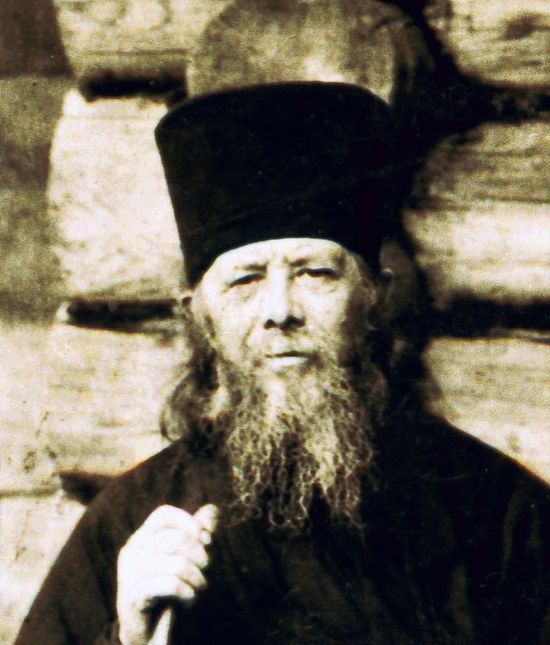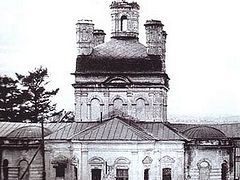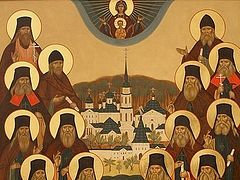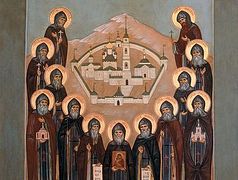Raised in Moscow, the future Elder Anatole, stayed there until his teenage years. Born Alexander Potapov, he had a desire to go become a monk from an early age but when he approached his mother with this she asked that he wait until she died, and to honor her he agreed. After graduating from high school, he became a clerk in Kaluga. In 1885, after the repose of his mother, he went to Optina, at the age of thirty. He was made a novice in 1888 and became the cell attendant of Elder Ambrose. While a cell attendant, Elder Ambrose would occasionally send people to him because he showed the gifts of clairvoyance and love.
After the death of Elder Ambrose, Alexander became the cell attendant of his successor, Elder Joseph. In 1895 he was tonsured a monk and given the name Anatoly in honor of St. Anatole, Patriarch of Constantinople. In 1899, he was ordained a deacon and people began to come to him as an elder. Later, he had the gift of healing but hid it, instructing people to go pray for healing at Elder Paphnutius' grave or attributing it to Elder Ambrose, among other things. Many witnessed to his gifts of clairvoyance and prophecy, especially regarding the future of the Church. In 1906 he was ordained a priest and then appointed as the spiritual father of the neighboring Shamordino Convent which position he held until his death. In 1908, the confessor of the skete reposed, and Fr. Anatole was asked to take over the post. He responded saying, “How blessed,” and moved from the monastery to the skete.
He took his time with each pilgrim despite a painful hernia that he developed as well as painful and bleeding legs. Despite his infirmities it is noted how he was attentive and loved listening to their complaints and sorrows. Often he would give out the book On True Christianity by St. Tikhon of Zadonsk. He was “uncommonly simple and kind.” Old women especially loved him. His treatment of people was said to be reminiscent of St. Seraphim or Sarov and he was affectionately called Anatole the Comforter.
Elder Nektary said of Elder Anatole when a pilgrim had gone to him for advice, “Well now, that’s good that you wound up going to Fr. Anatole for guidance. Some people seek me out as an elder; but I—what can I tell you—I’m just a pie without a filling. But Fr. —well, he’s just like a pie with filling.” Elder Nektary always preferred to remain in the background, therefore, in his humility, when he saw visitors approaching his own cell he would go up to them and say, “Whom are you going to?” and would lead them away to Elder Anatoly without them suspecting anything.
Elder Anatole fulfilled this ministry up until that fateful year of 1917. In this year the prophecies of previous elders were fulfilled—monasteries were closed down and monks imprisoned. Shortly thereafter the elder was arrested and his beard and hair were cut. He was released and went back to the monastery being exhausted and looking “barely alive." he crossed the threshold of his cell crossing himself and saying, “Glory to Thee, O God; glory to Thee, O God; glory to Thee, O God!”
In 1921, when the elder was quite infirm, Abbot Isaac suggested that the elder accept the Great Schema. He did and during the service he was so weak that he could barely hold a candle. He slowly became better and was even able to get out of bed. There were more accusations against the monastery as the new government wanted to close it down for being a “hotbed of counter-revolutionary activity.” In 1922, they again came to arrest the elder. He asked to be given twenty-four hours in which to prepare and this they allowed. They came back the next day and found him reposed lying in his coffin in the middle of his cell.
Sayings of Elder Anatole (the “Younger”) of Optina
On Pride and Humility
Pride comes in various forms. There is worldly pride: this is knowledge; and there is spiritual pride: this is self-love. This is exactly so: people will truly go insane if they expect their intellect to cope with everything they hope to receive from it. But how can our mind get down to its own business, since it is insignificant and infected? Take from it that which it is able to give, and make no further demand upon it. Our teacher is humility. God resists the proud, but gives grace to the humble: and the grace of God is everything… That’s your greatest wisdom. Humble yourself and say to yourself: ‘Although I’m a speck of earthly dust, still God cares for me, and may the will of God be done in me.’ If you say this not only with your mind, but also with your heart, and really boldly, as becomes a true Christian, rely on the Lord with a firm intention to submit to the will of God, whatever it may be, without murmuring, then the clouds will disperse before you and the sun will look out, and will enlighten and warm you, and you will know true joy from the Lord and everything will seem clear and transparent to you, and you will cease tormenting yourself, and it will become light in your soul.
* * *
Bibliography
Andreyev, Ivan, Russia’s Catacomb Saints (Platina: St. Herman of Alaska Press, 1982).
“The Prophet’s Mantle” at http://www.roca.org/OA/44/44d.htm accessed on December 31, 2013.
“Anatolius and Seraphim of Optina, Hieroconfessors” athttp://www.orthodox.net/russiannm/anatolius-and-seraphim-of-optina-hieroconfessors.html accessed on December 31, 2013.
“The Full Life of St. Anatole (Potapov), Elder of Optina” athttp://www.optina.ru/starets/anatoliy2_life_full/ accessed on December 31, 2013(in Russian).
“Reverend Anatole of Optina: A Short Life” athttp://www.optina.ru/starets/anatoliy2_life_short/ accessed on December 31, 2013(in Russian).




